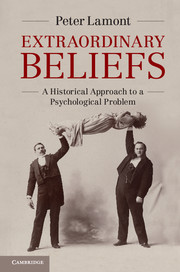Book contents
- Frontmatter
- Contents
- A brief reflexive preface
- Acknowledgements
- ONE Introduction
- TWO The making of the extraordinary
- THREE The making of mesmeric phenomena
- Four The making of spiritualist phenomena
- FIVE The making of psychic phenomena
- SIX The making of paranormal phenomena
- SEVEN The making of extraordinary beliefs
- Notes
- Bibliography
- Index
TWO - The making of the extraordinary
Published online by Cambridge University Press: 05 April 2013
- Frontmatter
- Contents
- A brief reflexive preface
- Acknowledgements
- ONE Introduction
- TWO The making of the extraordinary
- THREE The making of mesmeric phenomena
- Four The making of spiritualist phenomena
- FIVE The making of psychic phenomena
- SIX The making of paranormal phenomena
- SEVEN The making of extraordinary beliefs
- Notes
- Bibliography
- Index
Summary
Derren Brown looked into the eyes of the famous chef, Michel Roux. It was 2004, and Brown was already the best-known mind-reader in Britain. He asked Roux to think of a memory from his distant past, then told the chef to look directly at him. A few moments later, he announced the name of Roux's childhood dog. Brown had already performed a similar feat on a popular daytime television programme, as part of a seemingly genuine demonstration of his ability to read unconscious eye movement. Looking into the eyes of the television presenter, Phillip Schofield, Brown managed to discover that Schofield was thinking of the death of his childhood pet hamster. These were presented as psychological feats and, as in any magic trick, there was an element of psychology involved. However, they were illusions, which relied upon techniques of which the viewers (and, presumably, the former pet owners) were unaware.
Brown is only one of countless performers who have demonstrated such extraordinary feats, which seem to be the result of extraordinary psychological abilities, but which are not what they appear to be. Such mind-reading abilities are far beyond what anyone can do, according to our current understanding of the mind. Thus, if they are real, they should be called paranormal. However, they have been presented not as paranormal, but rather as psychological, and many people have believed that, as such, they are real. These people, then, have believed in the paranormal, though if asked, they probably would have denied it. On the other hand, had these feats been presented explicitly as magic tricks, few people would have believed that they were genuine (indeed, fewer people would have been interested in the first place). Those who have demonstrated extraordinary phenomena have presented them in particular ways, and these have directly influenced what people have made of them. In order to understand their reception, then, we need to understand their production. Hence, we shall begin, as so many of these performers did, with the performance of conjuring tricks.
- Type
- Chapter
- Information
- Extraordinary BeliefsA Historical Approach to a Psychological Problem, pp. 34 - 62Publisher: Cambridge University PressPrint publication year: 2013



